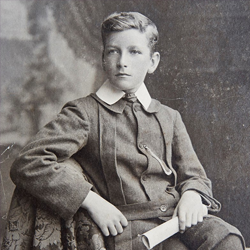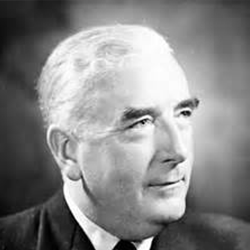Sir Robert Menzies (1894-1978), Australia’s longest serving Prime Minister, is arguably Wesley College’s best-known alumnus.
Throughout his political career, which included more than 18 years as Prime Minister, 1939 to 1941 and 1949 to 1966, Menzies played a central role in the creation of the Liberal Party and made significant changes to the political landscape in the post-war era.
Attributes, accolades and academic success
Menzies joined Wesley College as a well-read, articulate and incisive boy. He excelled at school, revealing a true passion for literature and language and throughout his life was widely acclaimed for his brilliance as an orator.
In his third and final year at Wesley, Menzies was publicly recognised for his academic prowess and flair for language, winning the prize for original poetry on the subject of heritage and heroism.
After school Menzies entered the law and then politics, for what would be a long and distinguished career.
A deep respect for education

From a young age, Menzies had a profound respect for education and a strong belief in its transformative power – values that were amplified by his Wesley experience and the teachers who inspired him.
Menzies demonstrated this conviction consistently while in office. In the late 1950s, the Menzies government revolutionised universities, tripling federal government funding, improving infrastructure, providing grants and significantly increasing academic salaries.
In the 1960s, the Menzies Government announced a new package of State aid for independent and Catholic schools. Menzies also provided funds for 10,000 scholarships to helps students stay at school for the last two years, with a further 2,500 scholarships for technical schools.
An advocate for social reform and community service
Menzies’ political reforms reflected his values of respect, social justice and service in the community, which continue to underpin the Wesley ethos today.
While Prime Minister, Menzies carried out social reforms including:
- the 1962 Commonwealth Electoral Act, which gave all Indigenous Australians the right to enrol and vote at federal elections
- a pharmaceutical benefits scheme that expanded the range of prescribed medicines subsidised by the government
- the extension of the Commonwealth Child Endowment scheme (a child benefit paid directly to the mother)
- the Pensioner Medical and Free Medicines service and the Aged Persons' Homes Assistance scheme
- increased rates of pension, unemployment and sickness benefits.
A legacy lives on
Menzies’ political legacy is beyond dispute, and for the Wesley College community Menzies is the ultimate embodiment of our College motto Sapere Aude – ‘Dare to be Wise’. He will be remembered as a man who used his knowledge, intelligence and values to contribute to creating a better world.
Banner image: Bronze sculpture of Menzies as a school boy with Heather Henderson, daughter of Sir Robert Menzies.